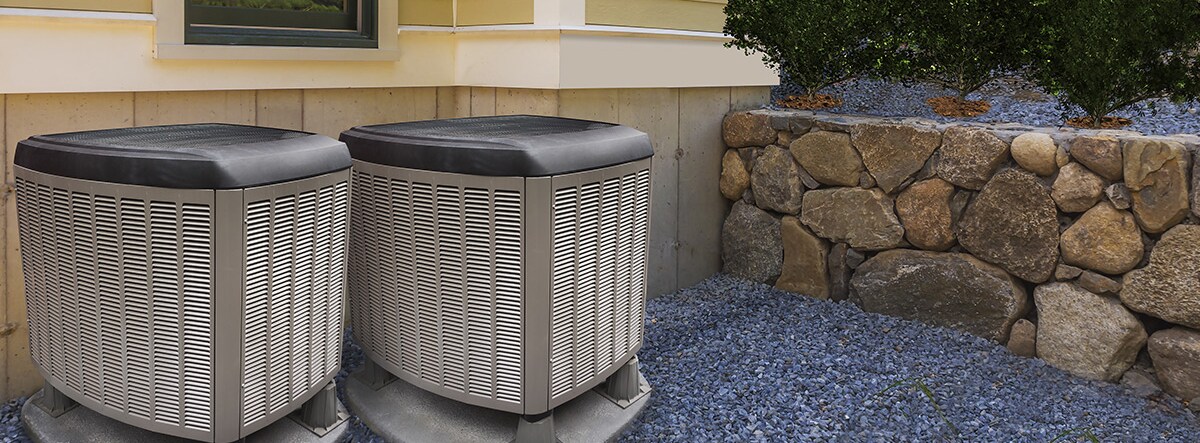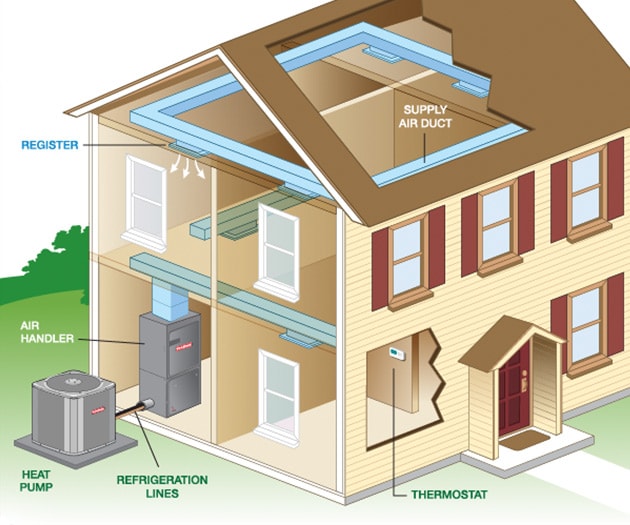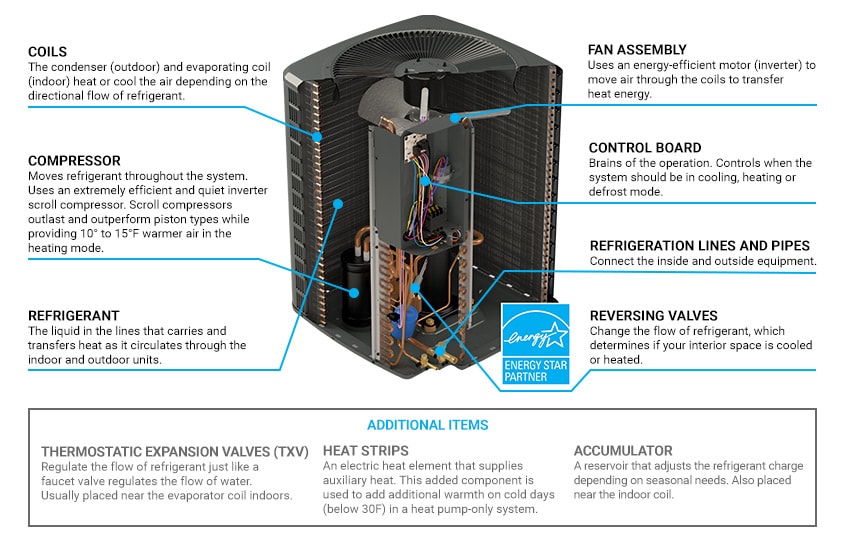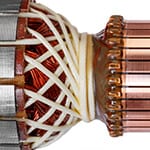
Heat Pumps 101
How Central Heat Pumps Work
Heat pumps are taking the country by storm thanks to their comfort, energy efficiency, and the tax credits they qualify for under the Inflation Reduction Act. Don't miss out on taking advantage of heat pump technology and the cost-savings that come with it.
At first glance, a central heat pump system looks exactly like a forced-air furnace and A/C setup found in most homes, with one major exception - there isn't a furnace. In its place is what looks like a furnace, but instead is an air handler that includes a blower fan and an evaporator coil.
Rather than using a gas furnace that burns fossil fuels for energy (inefficient), heat pumps use an outdoor condenser for both heating and cooling.

Image: Goodman Manufacturing
In the dog days of summer, the heat pump acts as an air conditioner, removing heat from the home and expelling it outside. But, when the weather turns colder, that's when the real magic happens. The unit reverses the flow of refrigerant, captures heat from the atmosphere, and brings that warmth inside.
How Does a Heat Pump Work?
To better understand how a heat pump adds or removes heat inside your home, it's good to know how the parts work together to form the system.
Parts of a Heat Pump
Split into two parts; the system contains an outdoor unit that looks similar to an air conditioner and an indoor air handler. Your heat pump, in conjunction with the air handler, distributes the conditioned air into rooms of your home.
Take a look at the cutaway diagram below to see what a heat pump system includes.

Why Are Heat Pumps So Efficient?
While shopping for electrical appliances, you may notice that many are now featuring what's called "Inverter Technology". But what does that mean, and how does it translate into energy savings?
An inverter is just a 'smarter' type of motor, and it's the motor that consumes the most electricity in any given appliance, especially a heat pump or air conditioner. Because it's up against the resistance of the compressor, it takes a significant amount of energy to compensate. So, the motor is made 'smart' with an inverter, or onboard computer.
The main difference between an inverter and a standard air conditioner is that an inverter motor has a built-in computer that is capable of variable speeds to drive the compressor. A sensor inside continually adjusts the power according to the temperature, lowering the electrical consumption while saving energy.
Thanks to this energy efficiency, which ultimately benefits the environment, the federal government allows homeowners to save up to $2,000 on the costs of upgrading to heat pump technology under the Inflation Reduction Act. As a result, now is one of the most logical times to make the switch to heat pumps!
Can Anyone Use a Heat Pump?
One of the most common questions we hear is if you can use a heat pump in a system with a furnace.
Q: "I live up north in a colder climate. If I have a furnace, does that mean I can't use a heat pump and reap the energy cost savings?"
A: Anyone can use a heat pump in addition to a gas furnace system to maximize efficiency and comfort. One of the unique benefits of using a heat pump is the ability to custom-tailor the comfort of your home without wasting energy.
Think of it as the Goldilocks of central HVAC equipment. During the changing of seasons, where it's hot and humid during the day but frigid at night, a heat pump handles both tasks efficiently and seamlessly. Instead of running the air conditioner and being too cold or running the furnace and being too hot, your heat pump system will keep everything just right!
That being said, the kind of system setup you buy will differ whether you live in a warmer or colder climate. For colder climates, I recommend a heat pump and furnace kit. During winter's coldest days, the furnace will kick on. When it's spring and autumn, the heat pump will go to work, saving you energy. Those in warmer climates won't need a furnace but will require an air handler to allow the heat pump to warm and cool their home.
Heat Pump vs. Furnace
Now that you know how a heat pump system works to keep you comfortable year-round, it will be easier for you to pick out features that are important to you.
Next, we'll take a look at the differences between central heat pumps and furnaces, so that you can be 100% confident in choosing your next heating and cooling system.
Central Forced-Air Buyer's Guide Navigation
HVAC-101 | Gas Furnaces-101 | Heat Pumps-101 | Packaged Units-101 | Air Conditioning-101 | Air Handlers-101
Share My Personal Information\":{\"href\":\"https:\\\/\\\/ferguson.bigidprivacy.cloud\\\/consumer\\\/#\\\/dMf02ovZbN\\\/Form-NHWperWAaFNVIQK\",\"title\":\"Do Not Sell or Share My Personal Information\"}},\"About Us\":{\"Our Story\":{\"href\":\"https:\\\/\\\/www.powerequipmentdirect.com\\\/stories\\\/1982-How-We-Make-Buying-Technical-Products-Simple.html\",\"title\":\"eComfort's Story\"},\"Careers\":{\"href\":\"https:\\\/\\\/www.powerequipmentdirect.com\\\/stories\\\/1924-Job-Openings.html\",\"title\":\"Careers @ Power Equipment Direct\"},\"Newsroom\":{\"href\":\"newsreleases.php\",\"title\":\"eComfort News Center\"}},\"Contact Us\":{\"phone\":\"866-554-4328\",\"hours\":[\"M-F: 8-5 CST\",\"Sat: Closed\",\"Sun: Closed\"]}}","storeLinkJSON":"{\"AC Wholesalers\":{\"href\":\"https:\\\/\\\/www.acwholesalers.com\",\"title\":\"AC Wholesalers\"},\"Air Compressors Direct\":{\"href\":\"https:\\\/\\\/www.aircompressorsdirect.com\",\"title\":\"Air Compressors Direct\"},\"Chain Saws Direct\":{\"href\":\"https:\\\/\\\/www.chainsawsdirect.com\",\"title\":\"Chain Saws Direct\"},\"Chippers Direct\":{\"href\":\"https:\\\/\\\/www.chippersdirect.com\",\"title\":\"Chippers Direct\"},\"eComfort\":{\"href\":\"https:\\\/\\\/www.ecomfort.com\",\"title\":\"eComfort\"},\"Electric Generators Direct\":{\"href\":\"https:\\\/\\\/www.electricgeneratorsdirect.com\",\"title\":\"Electric Generators Direct\"},\"Leaf Blowers Direct\":{\"href\":\"https:\\\/\\\/www.leafblowersdirect.com\",\"title\":\"Leaf Blowers Direct\"},\"Log Splitters Direct\":{\"href\":\"https:\\\/\\\/www.logsplittersdirect.com\",\"title\":\"Log Splitters Direct\"},\"Mowers Direct\":{\"href\":\"https:\\\/\\\/www.mowersdirect.com\",\"title\":\"Mowers Direct\"},\"Power Equipment Direct\":{\"href\":\"https:\\\/\\\/www.powerequipmentdirect.com\",\"title\":\"Power Equipment Direct\"},\"Pressure Washers Direct\":{\"href\":\"https:\\\/\\\/www.pressurewashersdirect.com\",\"title\":\"Pressure Washers Direct\"},\"Snow Blowers Direct\":{\"href\":\"https:\\\/\\\/www.snowblowersdirect.com\",\"title\":\"Snow Blowers Direct\"},\"String Trimmers Direct\":{\"href\":\"https:\\\/\\\/www.stringtrimmersdirect.com\",\"title\":\"String Trimmers Direct\"},\"Sump Pumps Direct\":{\"href\":\"https:\\\/\\\/www.sumppumpsdirect.com\",\"title\":\"Sump Pumps Direct\"},\"Tillers Direct\":{\"href\":\"https:\\\/\\\/www.tillersdirect.com\",\"title\":\"Tillers Direct\"},\"Water Pumps Direct\":{\"href\":\"https:\\\/\\\/www.waterpumpsdirect.com\",\"title\":\"Water Pumps Direct\"}}","socialLinkJSON":"{\"Facebook\":{\"href\":\"https:\\\/\\\/www.facebook.com\\\/eComfortusa\",\"icon\":\"icon-facebook\",\"title\":\"Facebook\"},\"Twitter\":{\"href\":\"http:\\\/\\\/www.twitter.com\\\/eComfortUSA\",\"icon\":\"icon-twitter\",\"title\":\"Twitter\"},\"Pinterest\":{\"href\":\"http:\\\/\\\/pinterest.com\\\/ecomfort\\\/\",\"icon\":\"icon-pinterest\",\"title\":\"Pinterest\"},\"YouTube\":{\"href\":\"https:\\\/\\\/www.youtube.com\\\/c\\\/Ecomfortholdings\",\"icon\":\"icon-youtube\",\"title\":\"YouTube\"},\"Instagram\":{\"href\":\"https:\\\/\\\/www.instagram.com\\\/ecomfortusa\\\/\",\"icon\":\"icon-instagram\",\"title\":\"Instagram\"},\"LinkedIn\":{\"href\":\"https:\\\/\\\/www.linkedin.com\\\/company\\\/power-equipment-direct\\\/\",\"icon\":\"icon-linkedin\",\"title\":\"LinkedIn\"}}","miscLinkJSON":"{\"Terms of Use\":{\"href\":\"terms-of-use.php\",\"title\":\"Terms of Use\"},\"Privacy Policy & Security\":{\"href\":\"privacy.php\",\"title\":\"Privacy Policy and Security\"},\"Cookie Policy\":{\"href\":\"privacy.php#cookiePolicy\",\"title\":\"Cookie Policy\"},\"CA Privacy Rights\":{\"href\":\"privacy.php#californiaPrivacyRights\",\"title\":\"CA Privacy Rights\"},\"copyright\":\"© 2024 Power Equipment Direct. All Rights Reserved\"}","checkoutMiscLinkJSON":"{\"Privacy Policy & Security\":{\"href\":\"privacy.php\",\"title\":\"Privacy Policy and Security\"},\"Cookie Policy\":{\"href\":\"privacy.php#cookiePolicy\",\"title\":\"Cookie Policy\"},\"Terms of Use\":{\"href\":\"terms-of-use.php\",\"title\":\"Terms of Use\"},\"copyright\":\"© 2024 Power Equipment Direct. All Rights Reserved\"}","expertJSON":{"imageURL":"https:\/\/www.powerequipmentdirect.com\/images\/experts\/expert-main-15-18.png","href":"\/ecomfort-product-expert.php","title":"Contact Ken @ eComfort","expertName":"Ken","expertTitle":"eComfort Product Expert"},"bbbJSON":{"imageURL":"https:\/\/www.powerequipmentdirect.com\/images\/badge-bbb.png","imageAlt":"Better Business Bureau","href":"http:\/\/www.bbb.org\/chicago\/business-reviews\/industrial-equipment-and-supplies\/power-equipment-direct-in-bolingbrook-il-57001088","title":"eComfort - A+ Rating - Better Business Bureau"},"zipCode":null,"phoneNumber":"866-554-4328","loginToken":"page cache precludes the use of csrf tokens","iterable":"e4b27e68b9c84fbb940829a0a9ee29d7","newNav":false}


